Log Book
Here’s a seasonal journal of Jade since taking ownership.
First Launch (2017-2018)
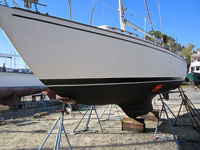
The boat was "on the hard" at Jennings Boatyard in Reedville. I started working in December of 2017 to get it ready for launch for Memorial Day Weekend in 2018 since I planned to sail down her to Urbanna. Besides replacing a frozen toilet overboard valve, cleaning the sails, buffing the hull, and replacing navigational lighting, I did work on the engine:
- Replaced leaking Fuel Supply Valve
- Repaired Ignition System (Coil, Points, Condenser, Spark Plugs)
- Replaced Start Button
- Replaced Choke Cable and Knob
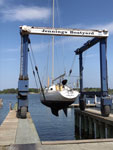
After launching for the first season, the carburetor gummed up and was replaced with a spare. The water temperature gauge and sender was replaced since it was not working (I believe now the ground wire to the gauge was shorting out). Then, the engine would overheat within minutes after starting. Soon afterwards a crack in the cylinder head was found just aft of the thermostat on the starboard side.
Unfortunately, I was running out of time to get her underway. I engineered an improvised platform structure, and rigged a small outboard motor to the aft swim ladder. I started sailing on Memorial Day, but did not get underway until afternoon. It got dark when approaching the Norris Bridge, and was forced to get towed in when the wind died and the engine could not be re-started.
Remaining 2018 Season

The entire focus of the remaining season was to replace the cylinder head. As the project progressed, I realized that it was easier to do other needed maintenance on the engine. In the end, a major engine overhaul - including overhauling the cooling system, repainting the engine, and rebuilding water pumps - was undertaken.
I would like to recognize Moyer Marine, Inc. as THE source for Universal Atomic 4 engine parts, kits, manuals, and in-house knowledge. Without them I would have never got the engine back in shape.
The engine work was done when I successfully started the engine in December, 2018.
2019 Season
Spring and Summer
After the overhaul, the engine started easy and would run well. Although I’ve been sailing racing sloops since I was a teenager, I was not used to this size sailboat, so small trips with my more experienced friends were the regular sailing trips starting after Memorial Day weekend.
Engine Overheating
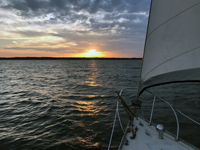
However, the engine would overheat at varying times. After some troubleshooting, I made the following corrective actions:
- Acid cleaned the exhaust pipe and water entry fitting
- Cleaned the water lift muffler
- Installed anti-siphon valve in cooling water line going to water lift muffler, as recommended
- Replaced exhaust hose (engine to muffler), clamps, and insulation
- Installed a Raw Water Strainer on water inlet line
- Installed 3-Way valves (one at inlet and one at outlet) for engine flushing and to bypass the water lift muffler
During this time, I was able to get the boat out on the river for day trips. When the engine started overheating, I rigged a hose overboard from the 3-Way valve (outlet) to bypass the water lift muffler. Afterwards, the engine temperature would return to normal operating temperatures - from 160 to 180 Degrees F.
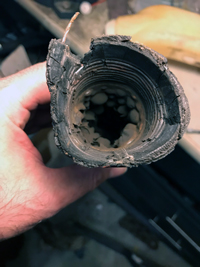
Fall Season and Exhaust System Blockage
During a recent sail, I noticed that the engine’s power slowly fell off to the point it seemed ready to stall, as if the exhaust was being blocked. A very experienced boater mentioned that a Catalina had to have her exhaust hose replaced recently; specifically the "cold section" from the muffler to the overboard outlet. I recalled that the inside of the hose (left) that lead from the engine exhaust piping to the water lift muffler had been restricted due to breakdown of the material.
I’m almost certain that this was the original issue with the engine overheating. Since I was not experienced in how much power the engine produced, I missed the cue that not just the cooling water, but the engine exhaust gases were being blocked.
2020 Season
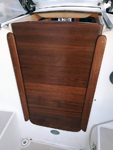
With the first New Year of decade, I was able to have the cabin door replaced with the help of Yukon Lumber. The old ones were made of marine plywood and literally disentegrating since I bought the boat. Yukon Lumber put together solid teak wood sections using the old door as a pattern, and with a little of my own elbow grease for polish, I have one of the most beautiful things on the boat (next to the engine, that is!).
I also replaced the old exhaust hose with a new, thicker diameter product. No blockage was found in the old hose, but I think a kink probably developed when the exhaust heated a section up. Hopefully I can test that theory soon during a short cruise, since the weather has been so nice in Urbanna.

